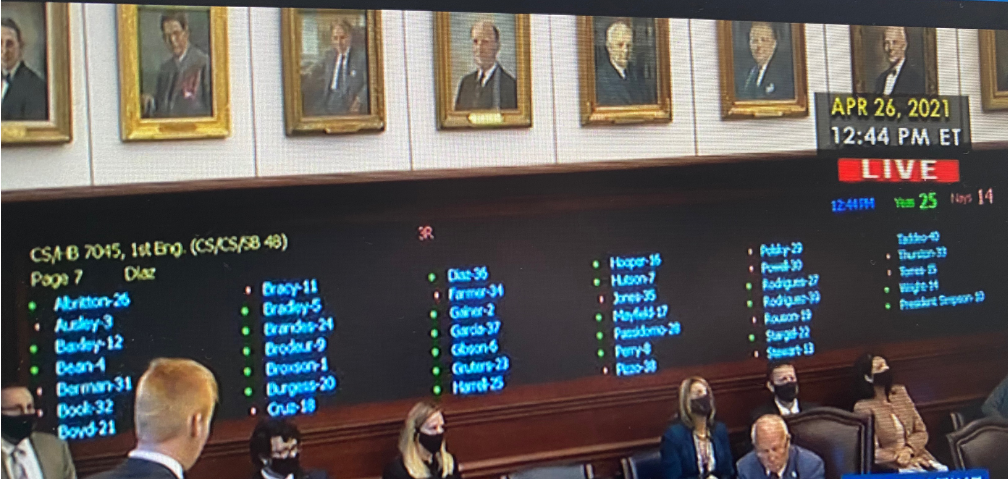
Florida state senators voted 25 to 14 today to approve an education bill that would align and streamline the state’s K-12 scholarship programs. The bill, which won final passage in the House last week, now heads to Gov. Ron DeSantis for his signature.
“I’m pleased to see the Senate stand with Florida parents who overwhelmingly support expanding eligibility for these popular school choice programs,” said Senate President Wilton Simpson, R-Trilby. “We know that parents are their children’s first and best educators, a fact that has certainly been highlighted over the last year.”
Simpson underscored his belief in the importance of making school choice an option for every family.
“This important legislation further streamlines our existing school choice scholarships and expands eligibility for lower income families, families of students with unique abilities, adopted children, and children whose parents serve in our military,” he said.
Sen. Manny Diaz Jr., R-Hialeah, who sponsored the Senate version of the bill, last week agreed to substitute that version with HB 7045, which would merge the state’s two scholarship programs for students with unique abilities, McKay and Gardiner, and combine them with the Family Empowerment Scholarship program approved in 2019. (Editor’s note: Families who want to learn more about how to apply for school choice scholarships can learn more here.)
One category of the Family Empowerment Scholarship would serve students with unique abilities and special needs while the other would continue to serve lower-income families.
“When we talk about these school choice issues, I think everyone in the room has the best intent,” Diaz said in his closing arguments for HB 7045. “But the question we have here is a philosophical choice. Do we trust our families to make the right decision for their students? Do we trust our parents to make the right decisions for our students?”
Diaz added that the coronavirus pandemic afforded parents a closer look at how their children were being taught, and as a result, many parents are demanding more opportunities for customization. The bill, he said, would allow that.
“We should be in the business of funding students, not institutions,” he said.
Diaz pointed out in response to opponents’ arguments against the bill that the state still supports district schools and has set aside $550 million for them in this year’s budget, along with $1,000 bonuses for teachers using federal COVID relief funds. He pointed out that the bill doesn’t take away any of that.
“All it does is invest more in the choices that parents can make for their child,” he said.
Diaz added that the bill ensures that all families currently receiving scholarships for students with unique abilities and special needs would receive the same amount of money or more and that the bill ensures long-term stability for these programs.
The bill would leave intact the Florida Tax Credit Scholarship program, which is funded by corporate tax donations, and the Hope Scholarship program for students who have experienced bullying at their district schools. The bill would simplify eligibility requirements by aligning qualifying income levels of the Florida Tax Credit Scholarship with the Family Empowerment Scholarship. Each program currently has different income requirements.
The bill also would provide one-stop shopping for families by placing management of the Family Empowerment program under nonprofit scholarship organizations, which include Step Up For Students, host of this blog.
Under the bill, families currently receiving flexible spending dollars under the Gardiner program would continue to receive their scholarships as education savings accounts; McKay’s traditional scholarships would be converted to education savings accounts starting in the 2022-23 school year. Families currently participating in each program would receive whichever dollar amounts were higher, whether that was in current law or in HB 7045.
HB 7045 also would make it easier for lower-income families to qualify for their category of the Family Empowerment Scholarship program by eliminating a requirement that students attend a district school the previous year to qualify for the scholarship. That requirement resulted in some families whose incomes took a hit due to a tragedy or during the pandemic from being turned down for scholarships that would have helped them keep their children in their private schools.
The bill also would make more families eligible by raising household income limits to 375% of the federal poverty level for both the FTC and FES. That would allow a family of four whose income was just under $100,000 to qualify. However, the bill gives priority to families earning 185% of the federal poverty level, which totals slightly more than $49,000 for a family of four.
In defending the bill from opponents who argue that choice programs drain money from public schools, Sen. Dennis Baxley, R-Lady Lake, expressed concern that long-disproved myths continue to be circulated even though there is no evidence choice has harmed district schools.
“It’s amazing how some stories still prevail even though we have 20 years of demonstrated change,” he said. “This is not the evil war. This is in fact the war to save our children’s future.”
Sen. Joe Gruters, R-Sarasota, praised Diaz for championing education choice.
“I think you’re leading the way for the whole country,” he said.
Gruters said HB 7045 should not be the end of the road for choice.
“It’s my hope we continue to expand these scholarships so we have universal school choice,” he said. “Every parent should have the right and the choice to send their children to whatever school they see fit.”